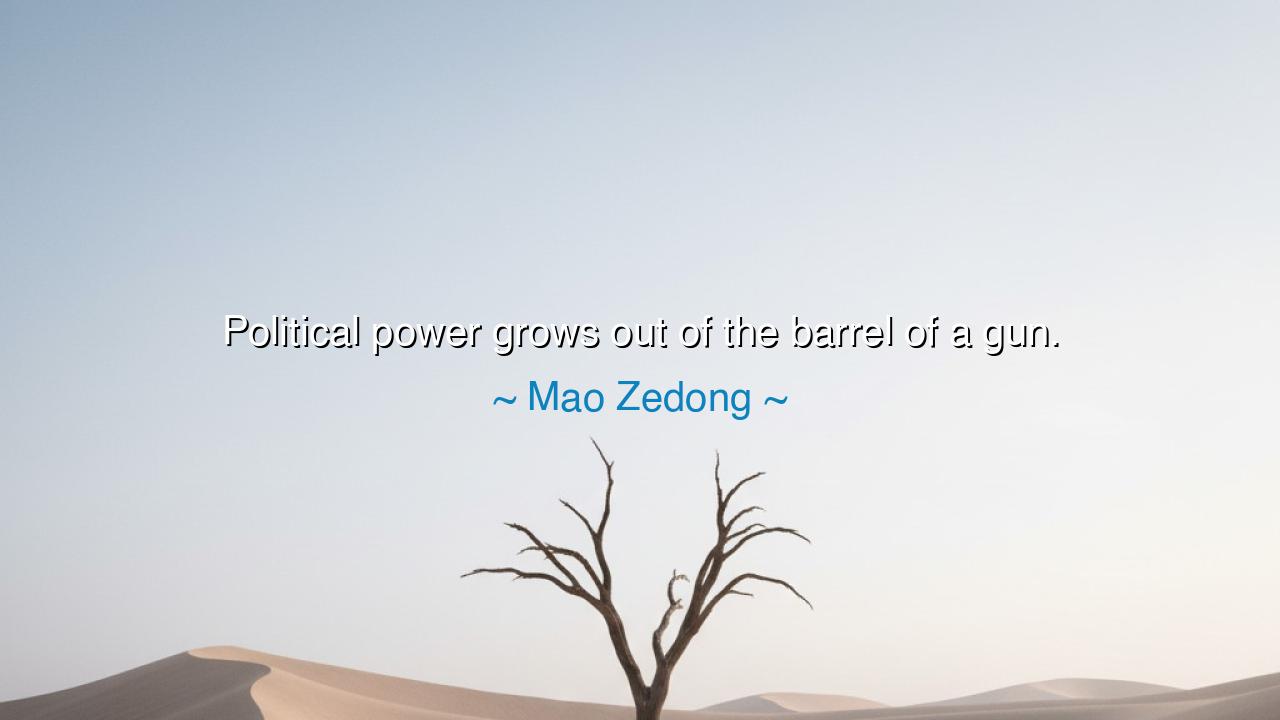
Political power grows out of the barrel of a gun.






Hearken, O children of the ages, to the stark and uncompromising words of Mao Zedong, who declared, “Political power grows out of the barrel of a gun.” These words reveal a truth both terrible and undeniable: that behind the banners of ideology, the debates of assemblies, and the promises of rulers lies the raw force of violence and coercion. Mao teaches that governments do not rest upon words alone, but upon the ability to enforce authority through military power, the ultimate arbiter of control in times of upheaval.
Mao spoke these words during the turbulent era of China’s revolutionary struggle, when the old imperial order had crumbled, warlords fought for dominance, and foreign powers sought to shape the land’s destiny. To him, political power was not a gift bestowed by divine right or peaceful persuasion. It was something seized through armed struggle, where the gun was the tool by which a vision of governance could be realized. His philosophy arose from a world of conflict, where weakness invited annihilation and strength alone commanded obedience.
History bears witness to this grim truth. Consider the French Revolution, where ideals of liberty and equality ignited the hearts of the people, but were secured only through the force of revolutionary armies. The guillotine and the musket, as terrible as they were, ensured that the revolution’s vision could survive amidst enemies within and without. Without military power, those ideals would have perished beneath the boots of returning monarchs. Mao’s words echo this reality: without the means to enforce it, even the noblest dream remains fragile and fleeting.
Yet, his teaching is not a call to endless bloodshed, but a recognition of the harsh nature of power. Leaders who neglect the realities of force are vulnerable to those who do not. Political power requires both vision and might: the vision to inspire and guide, and the might to defend and secure. The gun, in Mao’s philosophy, is not the source of legitimacy, but the guardian of it, ensuring that authority cannot be easily swept aside by rivals or foreign invaders.
O children of the future, carry this lesson with discernment. Understand that while force may be the foundation of authority, it must be tempered by justice and guided by wisdom. A government built only on the gun will breed fear and rebellion, while a government that wields strength in service of the people can endure. Let Mao’s words remind you of the weight of leadership, and of the peril that arises when rulers forget that power, once born of the gun, must ultimately serve the greater harmony of the realm.
Thus, these words stand as both a warning and a truth: that in the dance of politics and war, ideals may inspire the heart, but strength decides the fate of nations.






3O33-Thi Oanh
I’m intrigued by the strategic clarity in this quote, but it also raises moral concerns. Is Mao emphasizing pragmatic realism over ethical idealism? I wonder how this philosophy affects international relations, where the threat or use of force can overshadow diplomacy. Can political authority be built sustainably without relying on coercion, or is the capacity for violence an inherent and necessary aspect of governance that every leader must reckon with?
MLDo Minh Luan
This statement makes me question the ethics of power acquisition. If political control fundamentally comes from the capacity to use force, does that justify authoritarian measures under the guise of stability? I feel uneasy about how this principle has been applied throughout history. Could understanding this perspective help us prevent the misuse of power, or does it simply describe an unavoidable aspect of human politics that requires careful management?
GDGold D.dragon
Mao’s words prompt me to consider the nature of power itself. Is he saying that ideas alone cannot sustain authority, and that enforcement mechanisms are essential? I’m curious about historical examples where political movements gained legitimacy without relying heavily on force. Does this mean that moral or intellectual influence is secondary, or can it coexist with the threat of coercion to create lasting governance?
NHNhungg Hong
I find this statement both provocative and troubling. It suggests that political influence is inseparable from the capacity for violence. I wonder whether this view is a reflection of Mao’s historical context or a timeless truth about human governance. Can a state maintain authority without coercion, or is force always a latent factor behind political stability? I’d like perspectives on nonviolent movements and whether they challenge the inevitability implied here.
HNLai Hanh Nguyen
This quote makes me reflect on the connection between force and authority. It seems to imply that without physical power, political ideals are powerless. I feel concerned about how such a view can justify oppression or militarization. How do we reconcile the necessity of defense with the moral dangers of using violence to consolidate power? Could this philosophy be applied in contexts beyond warfare, like law enforcement or political intimidation?